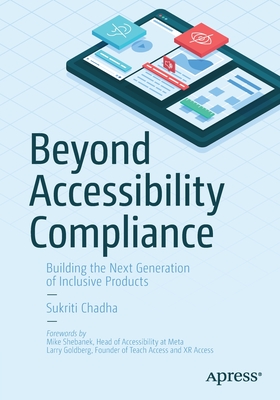Disability Interactions: Creating Inclusive Innovations
暫譯: 殘障互動:創造包容性創新
Holloway, Catherine, Barbareschi, Giulia
- 出版商: Morgan & Claypool
- 出版日期: 2021-12-22
- 售價: $3,360
- 貴賓價: 9.5 折 $3,192
- 語言: 英文
- 頁數: 218
- 裝訂: Hardcover - also called cloth, retail trade, or trade
- ISBN: 1636392857
- ISBN-13: 9781636392851
-
相關分類:
使用者經驗 UX
海外代購書籍(需單獨結帳)
商品描述
Disability interactions (DIX) is a new approach to combining cross-disciplinary methods and theories from Human Computer Interaction (HCI), disability studies, assistive technology, and social development to co-create new technologies, experiences, and ways of working with disabled people. DIX focuses on the interactions people have with their technologies and the interactions which result because of technology use. A central theme of the approach is to tackle complex issues where disability problems are part of a system that does not have a simple solution. Therefore, DIX pushes researchers and practitioners to take a challenge-based approach, which enables both applied and basic research to happen alongside one another. DIX complements other frameworks and approaches that have been developed within HCI research and beyond. Traditional accessibility approaches are likely to focus on specific aspects of technology design and use without considering how features of large-scale assistive technology systems might influence the experiences of people with disabilities. DIX aims to embrace complexity from the start, to better translate the work of accessibility and assistive technology research into the real world. DIX also has a stronger focus on user-centered and participatory approaches across the whole value chain of technology, ensuring we design with the full system of technology in mind (from conceptualization and development to large-scale distribution and access). DIX also helps to acknowledge that solutions and approaches are often non-binary and that technologies and interactions that deliver value to disabled people in one situation can become a hindrance in a different context. Therefore, it offers a more nuanced guide to designing within the disability space, which expands the more traditional problem-solving approaches to designing for accessibility. This book explores why such a novel approach is needed and gives case studies of applications highlighting how different areas of focus-from education to health to work to global development-can benefit from applying a DIX perspective. We conclude with some lessons learned and a look ahead to the next 60 years of DIX.
商品描述(中文翻譯)
殘障互動(Disability interactions, DIX)是一種新的方法,結合了人機互動(Human Computer Interaction, HCI)、殘障研究、輔助技術和社會發展等跨學科的方法和理論,以共同創造新的技術、體驗和與殘障人士合作的方式。DIX 專注於人們與其技術之間的互動,以及因技術使用而產生的互動。這種方法的一個核心主題是解決複雜的問題,這些問題的殘障因素是系統的一部分,並且沒有簡單的解決方案。因此,DIX 促使研究人員和實踐者採取基於挑戰的方法,使應用研究和基礎研究能夠並行進行。DIX 補充了在 HCI 研究及其他領域中發展的其他框架和方法。傳統的可及性方法往往專注於技術設計和使用的特定方面,而不考慮大規模輔助技術系統的特徵如何影響殘障人士的體驗。DIX 旨在從一開始就擁抱複雜性,以更好地將可及性和輔助技術研究的成果轉化為現實世界。DIX 還更強調以用戶為中心和參與式的方法,涵蓋技術整個價值鏈,確保我們在設計時考慮到整個技術系統(從概念化和開發到大規模分發和訪問)。DIX 也有助於認識到解決方案和方法往往是非二元的,並且在某一情境中為殘障人士提供價值的技術和互動,在不同的情境中可能會成為障礙。因此,它提供了一個更細緻的設計指南,擴展了傳統的可及性設計問題解決方法。本書探討了為何需要這樣一種新穎的方法,並提供了案例研究,突顯了從教育到健康、工作到全球發展等不同焦點領域如何受益於應用 DIX 觀點。我們最後總結了一些經驗教訓,並展望 DIX 的未來 60 年。
作者簡介
Cathy Holloway (she/her/hers) is a Professor of Interaction Design & Innovation at University College London's Interaction Centre, as well as a co-founder and the Academic Director of the Global Disability Innovation Hub (GDI Hub). Cathy co-directs the World Health Organization's (WHO) only Collaborating Centre on Assistive Technology at UCL. She graduated from the Na tional University of Ireland, Galway in Industrial Engineering (design stream) before embarking on a brief career as an R&D Engineer with Medtronic. She left Ireland to pursue her career in assistive technology and disability at University College London (UCL). This began with a Ph.D. that explored the biomechanics of wheelchair propulsion. During her Ph.D., years she hung out in equal measures at the Royal National Orthopaedic Hos pital, the Accessibility Research Group, and Science and Technology Studies. During this time, she developed her interest in the intersectionality of technology, disability, and poverty--and ultimately power within societies. Cathy went on to run the UCL Pedestrian Accessibility Movement Envi ronment Laboratory and learned a lot about UCL, academia, port, and life from her mentor and boss Prof Nick Tyler CBE. In 2016, she transferred her academic post from Accessibility Engineer ing to UCLIC as she began the journey to start the Global Disability Innovation Hub (GDI Hub) with her co-founders and friends Victoria Austin and Iain McKinnon. UCLIC is the base from which Cathy has found her vision and purpose, and the GDI Hub journey has allowed Cathy to realize her childhood dream to work in all areas of the globe and with people who are marginalized. She feels grateful and privileged each day for the opportunities she is afforded in her roles at UCL. Cathy's research will continue to try and advance the possible with technology while searching for social justice. Currently, this is achieved though her formal roles with the World Health Organiza tion, in her teaching and research, and by mentoring and leading a wonderful team.
Giulia Barbareschi (she/her/hers) is a Research Fellow in Disability and Assistive Technology Innovation at the Keio School of Media Design in Yokohama and the Global Disability Innovation Hub in London. She received her Ph.D. in 2018 from University College London, a Specialist Diploma in Medical Device Science from the National University of Galway in 2014, and a B.Sc. in Physiotherapy from the University of Genoa in 2008. From 2018 to 2021 she was a research fellow at the UCL Interaction Centre. Her research interest centers on the design, development, and evaluation of new and existing technologies to empower people with disabilities living in different parts of the world. This has included work on exploring the use of mobile phones by people with disabilities, developing and evaluating assistive technologies for mobility such as wheelchairs and lower limbs prosthetics, understanding how orientation and mobility skills support navigation for individuals with visual impairments, and evaluating the use of accessible technologies for improving access to inclusive education. A recent focus has been on how assistive technology influences self and external perceptions of disability across different cultures. Throughout her career Giulia has collaborated with several academic institutions across the world, start-ups and private ventures, NGOs, DPOs, and UN agencies.
作者簡介(中文翻譯)
Cathy Holloway(她/她的)是倫敦大學學院互動中心的互動設計與創新教授,也是全球殘疾創新中心(GDI Hub)的共同創辦人及學術主任。Cathy共同指導世界衛生組織(WHO)在倫敦大學學院的唯一輔助技術合作中心。她畢業於愛爾蘭國立大學戈爾韋分校,主修工業工程(設計方向),之後短暫擔任美敦力的研發工程師。她離開愛爾蘭,追求在倫敦大學學院(UCL)從事輔助技術和殘疾的職業生涯。這一切始於她的博士研究,探討輪椅推進的生物力學。在她的博士研究期間,她同時在皇家國立骨科醫院、無障礙研究小組和科學與技術研究中度過了許多時光。在此期間,她對技術、殘疾和貧困的交集,以及最終在社會中的權力產生了興趣。Cathy隨後負責運營UCL行人無障礙運動環境實驗室,並從她的導師和上司Nick Tyler教授(CBE)那裡學到了很多關於UCL、學術界、港口和生活的知識。2016年,她將學術職位從無障礙工程轉移到UCLIC,開始與她的共同創辦人和朋友Victoria Austin及Iain McKinnon一起創建全球殘疾創新中心(GDI Hub)的旅程。UCLIC是Cathy找到她的願景和目的的基地,而GDI Hub的旅程讓Cathy實現了她兒時的夢想,能夠在全球各地與邊緣化的人群合作。她每天都感到感激和榮幸,因為她在UCL的角色中獲得的機會。Cathy的研究將繼續努力推進技術的可能性,同時尋求社會正義。目前,這是通過她在世界衛生組織的正式角色、她的教學和研究,以及指導和領導一支出色的團隊來實現的。
Giulia Barbareschi(她/她的)是橫濱慶應義塾媒體設計學院和倫敦全球殘疾創新中心的殘疾與輔助技術創新研究員。她於2018年在倫敦大學學院獲得博士學位,2014年在戈爾韋國立大學獲得醫療器械科學專業文憑,2008年在熱那亞大學獲得物理治療學士學位。從2018年到2021年,她是UCL互動中心的研究員。她的研究興趣集中在設計、開發和評估新技術和現有技術,以賦能生活在不同地區的殘疾人士。這包括探索殘疾人士使用手機的情況,開發和評估用於移動的輔助技術,如輪椅和下肢假肢,理解方向感和移動技能如何支持視障人士的導航,以及評估可及技術在改善包容性教育中的應用。最近的重點是輔助技術如何影響不同文化中對殘疾的自我和外部認知。在她的職業生涯中,Giulia與世界各地的多所學術機構、初創企業和私營企業、非政府組織、殘疾人組織(DPOs)以及聯合國機構合作。






























